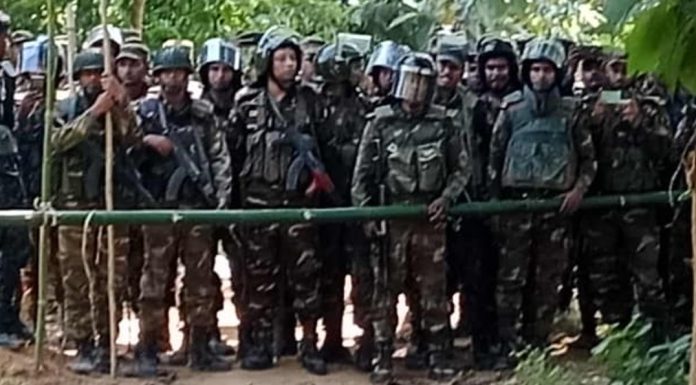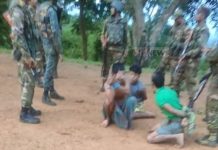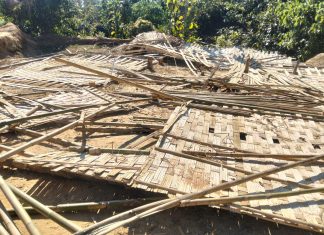Commentary
The current activities of the army deployed in the Chittagong Hill Tracts remind one of the story of Don Quixote and Sancho Panza. After reading many thrilling tales of chivalry, Don Quixote dreamed of becoming a knight himself. So, he set out on a series of adventurous expeditions, taking along as his companion a simple, realistic peasant named Sancho Panza.
On his adventures, Don Quixote perceived very ordinary things as great threats. For instance, he mistook windmills for giant monsters and attacked them. As a result, he was struck down by the windmill’s sails and fell to the ground defeated. But even then, he did not regain his senses — he thought he had been ambushed by some magical force. Eventually, after being defeated in battles against imaginary enemies, he returned home, abandoned his knightly identity, and died.
Likewise, the army stationed in the Chittagong Hill Tracts seems to be living in a world of fantasy like Don Quixote. They are treating ordinary matters as “threats to sovereignty” and attacking them. They are portraying the democratic political group, the UPDF, as terrorists and conducting operations against them. Yet, the UPDF itself has been a brutal victim of both state and vigilante terrorism. Over the last 27 years, around 400 of its leaders, activists, and supporters have been killed in these two forms of terror.
This is the tragedy of the hills: those who want to wage a democratic movement are branded as “terrorists,” while those who suppress them through terror are hailed as “patriots and defenders of sovereignty.”
The actual situation in the Chittagong Hill Tracts is this: there is no war, no armed struggle, no so-called insurgency. It is true that there are occasional fratricidal conflicts, but these were created and perpetuated by the ruling powers themselves through Santu Larma. If they truly wanted to stop such internal conflicts, they could easily do so by instructing their obedient ally, Santu Larma, and peace would immediately return to the hills.
Instead, what are they doing? They are spending millions of taka every day on operations and patrols that are making the lives of ordinary people unbearable. They raid homes, shops, and religious institutions — turning everything upside down in the name of “search operations,” looting money and valuables, harassing women, torturing and detaining innocent villagers, and sending them to jail.
During these operations, soldiers occupy school buildings and conduct military drills on school playgrounds, disrupting students’ education. They seize Buddhist temples and forcibly take temple property, desecrating the sanctity of these sites and obstructing both public worship and monks’ meditation. And all this is done in the name of “protecting sovereignty” and “combating terrorism.”
Every citizen of Bangladesh has the right to question what exactly the army stationed in the Hill Tracts is doing in the name of protecting sovereignty — how much money it is spending, how it is spending it, and why. Because this money comes from the people’s hard-earned taxes. The people of Bangladesh have certainly not leased the Chittagong Hill Tracts to the army to do whatever it pleases, nor are they obliged to accept everything the army says as truth.
After the recent settler attack in Ramesu Bazaar, Guimara, the army authorities in the Hill Tracts did not arrest the killers or attackers. Instead, they beat the drums of “sovereignty” and proposed to increase the number of army camps in the region. What is the real purpose of this proposal for more camps and military operations?
The main goals are:
- To protect and shield the soldiers and extremist settlers involved in the Guimara and Khagrachhari incidents.
- To intimidate and oppress the hill people so that in the future they dare not protest against rape, land grabbing, or other injustices.
- To destroy or weaken the only active political movement in the hills — the UPDF — so that the hill people are left leaderless. The military rulers know very well that no successful movement can be carried out without an organized leadership.
- To use the pretext of “protecting sovereignty” to justify the army’s continued presence in the Hill Tracts for their own vested interests, both domestically and internationally.
In short, the real purpose of these operations and camp expansions is not the defense of sovereignty — because there is no actual threat to Bangladesh’s sovereignty in the Hill Tracts, nor any possibility of one. The military authorities stationed there know this perfectly well.
Whether new camps are built or not, the Chittagong Hill Tracts is already filled with military camps. In fact, it is one of the most militarized regions in the world, with around 100,000 soldiers and paramilitary personnel deployed. Maintaining this massive militarization costs Bangladesh thousands of crores of taka each year — with no accountability whatsoever. And all this, too, is done in the name of “defending sovereignty.”
Every citizen of Bangladesh has the right to demand accountability for what the army is actually doing in the Hill Tracts in the name of sovereignty — how much money it is spending, how it is spending it, and why. This is the people’s tax money. The people have not leased the Hill Tracts to the army, nor must they blindly believe whatever it says.
Another justification the army gives for its actions is “counter-terrorism.” But that, too, is a hollow claim. The truth is that the army itself has created terrorist groups to suppress the democratic movement of the people. For the past 27 years, it has been doing precisely that — and in the process, it has itself become the embodiment of terror.
To put it plainly, because of the army’s wrong policies and actions in the Hill Tracts, the army and the people now stand face to face as enemies. This cannot continue. The Bangladesh Army must abandon its Don Quixote-like expeditions, return to the real world, and take political — not military — initiatives to resolve the recognized political problems of the Chittagong Hill Tracts.
(November 6, 2025)
————-












